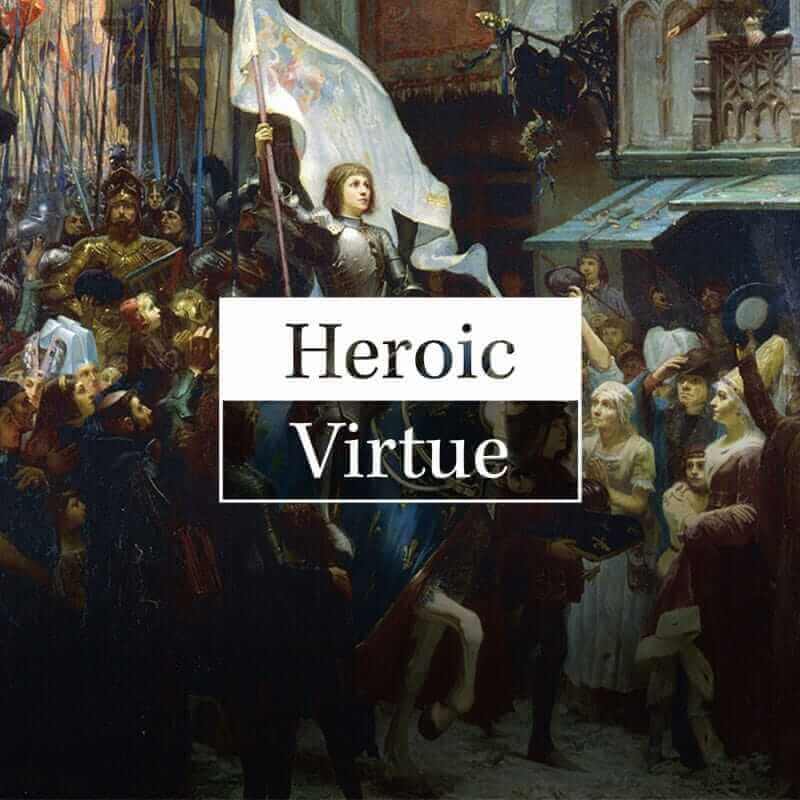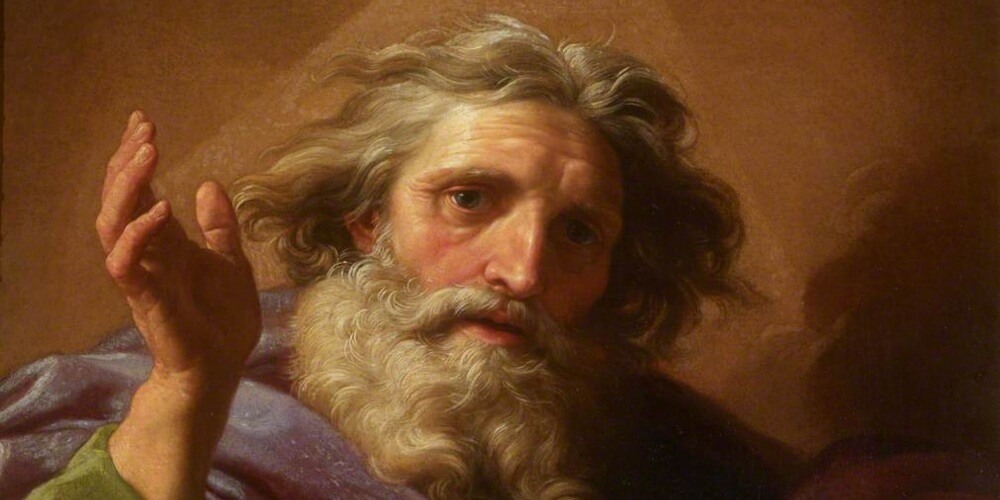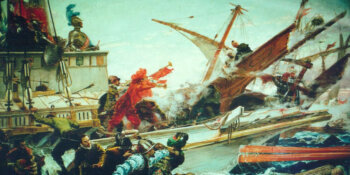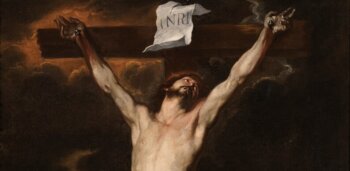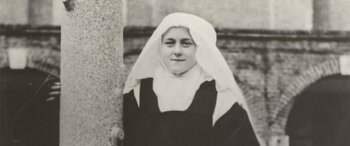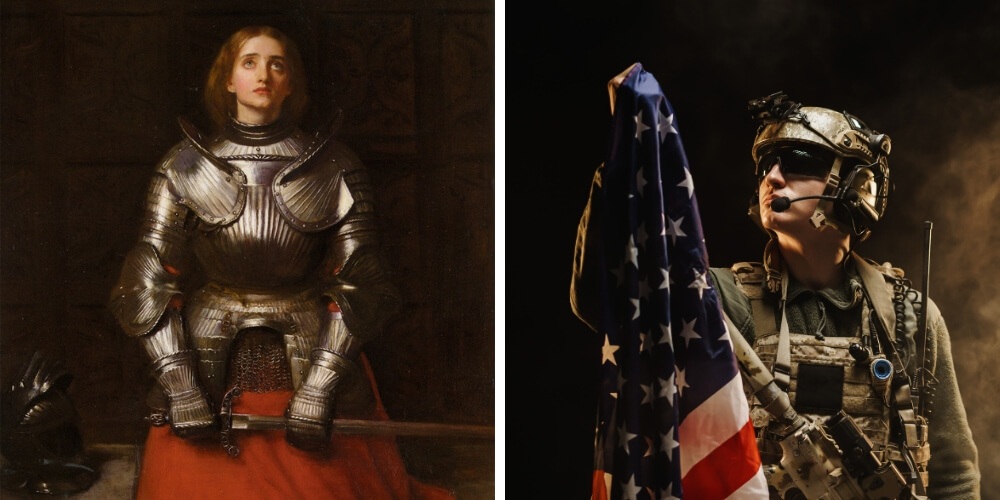
Patriotism is a misunderstood virtue.
Joan of Arc is a misunderstood saint.
Let’s examine the two together, and uncover the truth about each.
First, we’ll learn what patriotism is—then we’ll look at concrete examples of this virtue in the life of St. Joan of Arc.
Part I: What Is Patriotism?

The life of one person affects the lives of everyone else. We are part of a human family, gathered into nations, states, and smaller societies. God intends for the human family to live in harmony, which can only be realized when we are just in our dealings with one another.
One way to be just in how we treat one another is through the virtue of piety. Put simply, piety means dutifulness. We usually use the word piety in reference to prayer, but St. Thomas Aquinas defines this term more narrowly: piety “pays duty and homage to our parents and country.”
Piety toward our country is the virtue of patriotism, which means to “do our duty towards our kindred and well-wishers of our country and render them faithful service.”
…the principles of our being and government are our parents and our country, that have given us birth and nourishment. Consequently man is debtor chiefly to his parents and his country, after God.
St. Thomas Aquinas
We Need Patriotism to Be Just
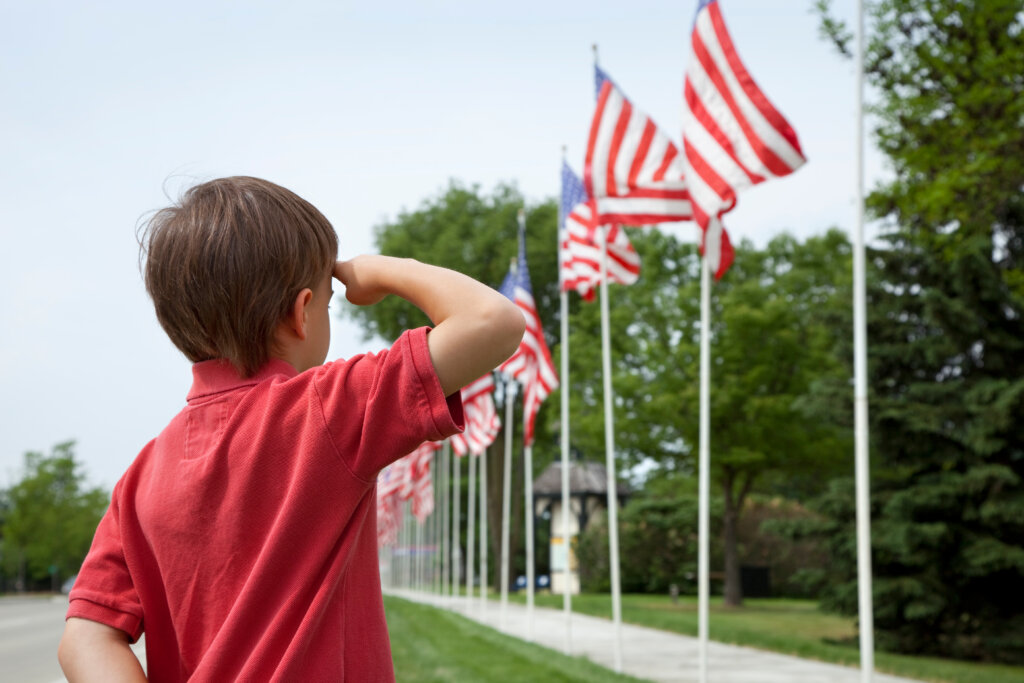
The Catholic Church has always taught that to be a good Christian, one must also be a good and loyal citizen to one’s country.
Pope Leo XIII, in his Encyclical Sapientiae Christianae, explained that patriotism is a matter of justice because it is a moral obligation of God’s Natural Law:
The natural law enjoins us to love devotedly and to defend the country in which we had birth and in which were were reared, so that every good citizen hesitates not to face death for his native land.
Patriotism is a fundamental principle that knits human society together:
This loyalty—this patriotism—this love of country—involves a triple affection. It embraces an affection for familiar places, an affection for familiar persons, and an affection for familiar ideas. One’s ‘country’ connotes all of these: the land itself, the persons on it, and the traditions associated with it.
One’s ‘native land’…is a link between generations, between families and friends, between common experience of the past and that of the present and future… Patriotism is not merely passive loyalty to country. It is active love of country. But true patriotism, like any true love, is cherished in humility, not in pride.
Catholic Organization for Peace in Europe (Study Presented to The Catholic Association for International Peace by The Europe Committee)
How Patriotism Helps Us Grow In Our Spiritual Life
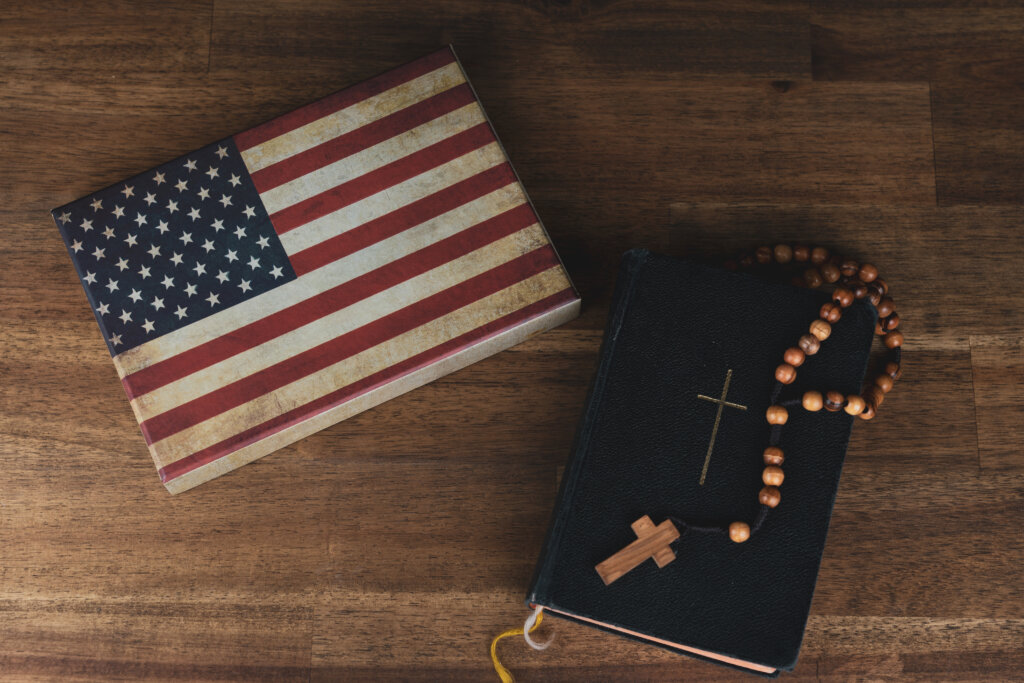
Scripture tells us that God is sovereign over the nations and that Christ reigns as King. Just as God has a specific plan and mission for each of us as individuals, and directs our future accordingly, He does the same for all the nations on earth. Throughout history we see how God raises up certain nations at certain times to fulfill His will for our salvation.
It is important for us to be a part of the work that God is doing in our country, both for the good of our country and our fellow citizens. This world is our common place of pilgrimage as we journey to heaven, and we must live virtuously and help direct our society to pursue the common good. That is why Jesus taught us to be salt and light (Matthew 5:13-16) in the places where we live.
Of the many saints who were patriotic, the one who stands out is St. Joan of Arc.
Part II: The Life of St. Joan of Arc
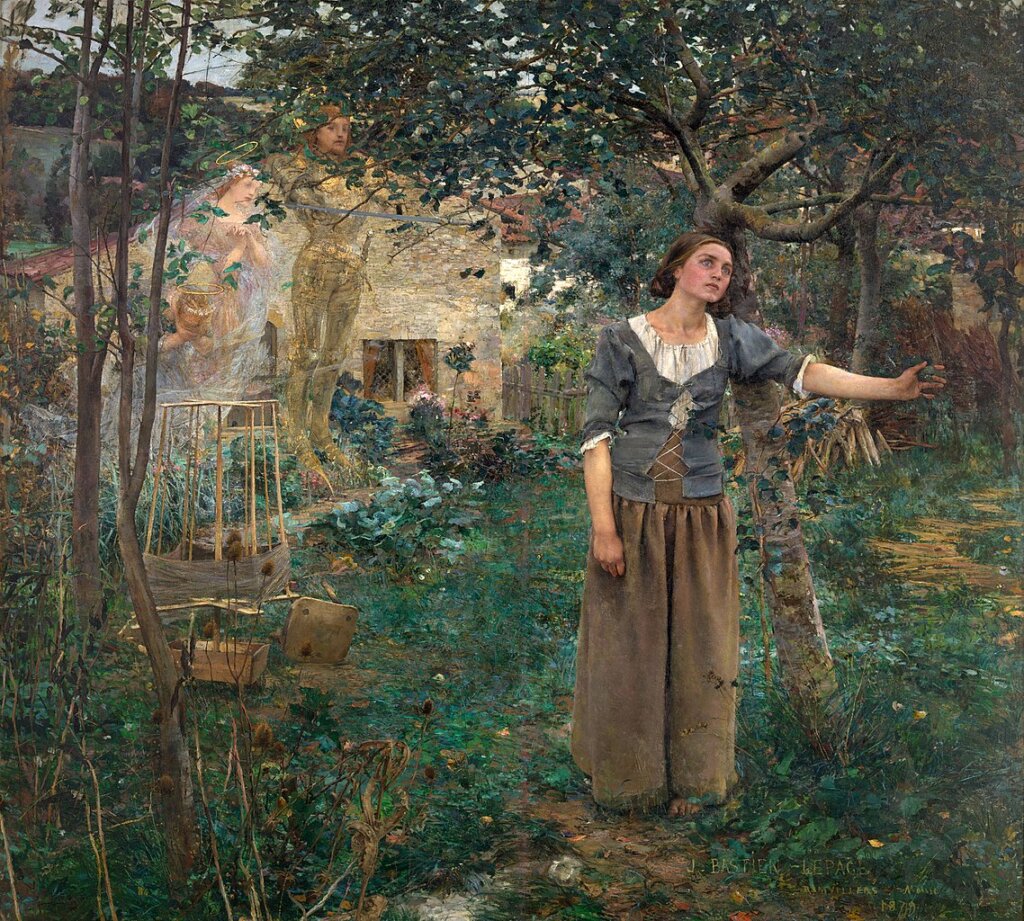
St. Joan of Arc (1412 – 1431) was born in Domremy, France, to peasant farmers. She was a devout child and led a simple life tending her family’s livestock. From the age of thirteen, she began to receive visions of saints, most notably St. Michael the Archangel, St. Margaret of Antioch, and St. Catherine of Alexandria. Through visions, voices, and other interior promptings, Joan understood that God was sending her on a great mission which would determine the future of France.
At this time the French and the English were locked in the Hundred Years War. France had not had a significant victory in a generation. During Joan’s time, almost all of northern France had been claimed by the King of England, including Paris. The English had pillaged and burned the French villages, which crippled France’s economy.

To make matters worse, there was no king on the French throne, and the identity of the rightful heir was a matter of dispute. Charles VII was the heir-apparent, but his parents entered into a treaty with England, giving the English King rule over France instead of their own son, whom they had disinherited. However, this treaty was believed by many to be invalid, as the King of France had not actually signed it.
France was also embroiled in civil war. There was little chance that King Charles VII, even if he were to be recognized as the rightful heir, could be coronated in Reims, or rule from Paris, as his enemies had possession of both of these cities.
The war with England came to a head when the English laid siege to the important city of Orleans, which lay along the Loire river. If Orleans fell, the English army would be able to move south and quickly conquer the rest of southern France that remained to Charles VII.
After a long siege the situation in Orleans became dire. The provisions had run out, there was no hope of getting more, and all diplomatic efforts had failed. Charles VII, seeing no way to prevent his beloved France from being ruled by their enemies, prayed earnestly for a sign from heaven in his private chapel.
The answer to his prayer was Joan of Arc.
After overcoming initial reluctance to obey her visions, eighteen-year-old Joan sought the help of her uncle to conduct her to the King of France.
Joan presented herself, full of confidence, and told the King that she had been sent by God to “raise the siege of Orleans and to aid you to recover your kingdom. God wills it so.”
Then she concluded, “Give me as many fighting men as you can afford to pay, for I have no doubt about doing all these things, even driving the English out of your kingdom.”
At this point the King had questions put to her about faith. She was queried on several other matters, namely, on things holy, on war, and other subjects of equal interest. She answered all questions with such intelligence that the king, the bishops, and the priests who were present were astonished, [for] this girl…had never done anything except watch over animals in the pastures.
She asked the king to recover a sword that lay hidden and unknown in a church dedicated to St. Catherine of Alexandria. It had been revealed to her by God that she would fight for her king with this blade. The sword was found exactly where Joan described, and it was brought to her in the king’s presence. She then requested armor, a horse, and a lance.
The king, for his part, was very cautious about placing this strange yet fascinating girl at the head of his royal army, especially dressed like a man. What if she had not really been sent by God, and was something worse—a trick of the devil—sent to deceive him?
He asked Joan for proof that she had truly been sent by God. In reply, she recounted in exact detail the three petitions he had made privately to God in his own chapel.
The King admitted she knew the truth and with faith in her said, “I believe God has sent you and I have great hope that you will help me regain my kingdom.”
He then had Joan outfitted for war.
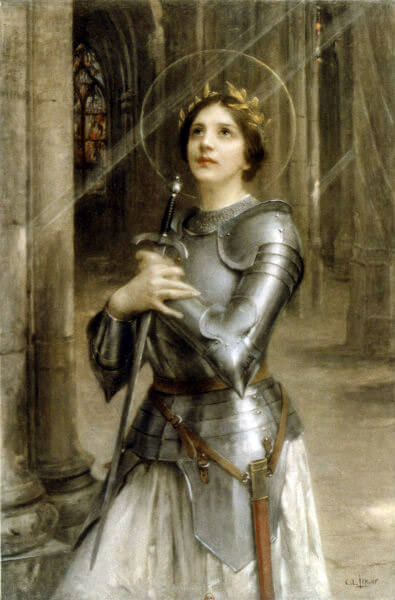
Calling herself “the Maid,” Joan participated in the king’s war councils, and often debated with the other captains on what course of action to take. She possessed a military mind as keen as the captains who had fought in wars all their lives. Time and again, her decisions proved to be the right ones, to the amazement of all. At times the king would hold private war councils without summoning Joan, yet she miraculously knew everything they discussed and the decisions they made.
The most pressing need was to provide provisions to the besieged Orleans, which was almost at the point of falling to the English. While they were gathering the supplies, Joan wrote the following letter to the King of England:
JESUS, MARY
King of England, render account to the King of Heaven of your royal blood. Return the keys of all the good cities which you have seized, to the Maid. She is sent by God to reclaim the royal blood, and is fully prepared to make peace, if you will give her satisfaction; that is, you must render justice, and pay back all that you have taken.King of England, if you do not do these things, I am the commander of the military; and in whatever place I shall find your men in France, I will make them flee the country, whether they wish to or not; and if they will not obey, the Maid will have them all killed…And believe that the King of Heaven has sent her so much power that you will not be able to harm her or her brave army.
…I say to you in God’s name, go home to your own country; if you do not do so, beware of the Maid, and of the damages you will suffer. Do not attempt to remain, for you have no rights in France from God, the King of Heaven, and the Son of the Virgin Mary…
…make a response, if you wish to make peace over the city of Orleans! If you do not do so, you will always recall the damages which will attend you.
…If you do not render her satisfaction, she and the French will perform the greatest feat ever done in the name of Christianity.
Done on the Tuesday of Holy Week (March 22, 1429). HEAR THE WORDS OF GOD AND THE MAID.
The English, of course, did not surrender their hold on Orleans. Joan proceeded to organize a convoy to smuggle food and provisions into the city to support the citizens. The next day she successfully masterminded and led her first assault on the fortresses the English had built around Orleans. The city was reclaimed and returned to Charles VII’s rule. After this victory, Joan reconquered many more French cities.
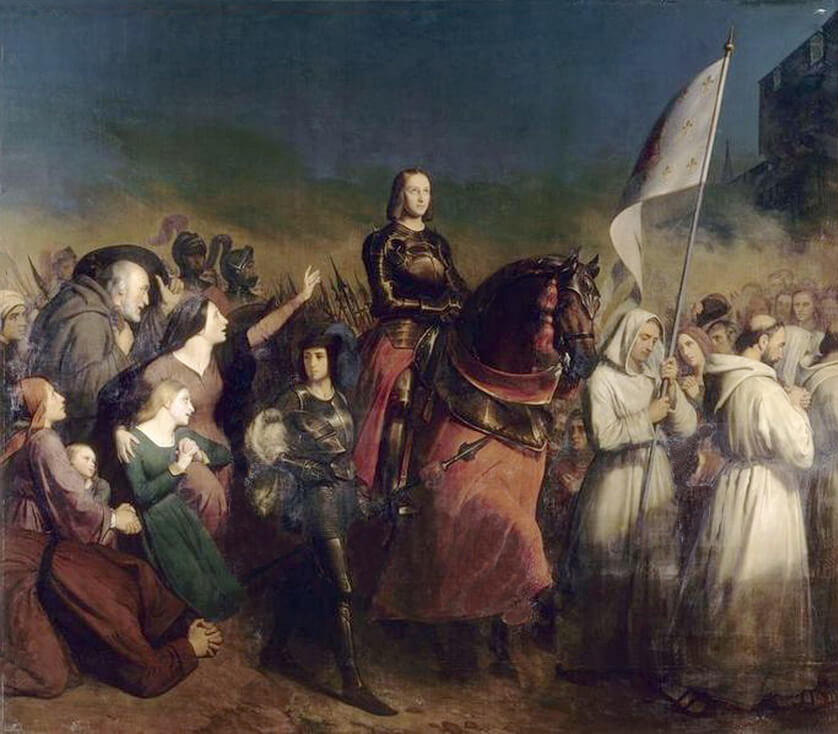
Having successfully achieved all of her designs up to this point, she was eager to complete her God-given mission by conducting Charles VII safely to Reims where he could be coronated as the King of France. She safely conducted Charles to Reims where he was crowned the King of France in 1429. Joan stood next to him carrying his battle standard.
After the coronation Joan and her King proceeded to free more cities from English rule. Joan’s next military feat was to aid the inhabitants of Compiegne, who were being besieged by the Duke of Burgundy. But a trap was laid for her and she was captured as a prisoner of war.
When he heard of this, the King of England greatly desired to have Joan as his prisoner because of the great embarrassment that she, a young woman, had caused him in defeating his armies. Unable to convince the Duke to release her into his custody, the King devised another plan. They would get possession of her not as a prisoner of war but as a public menace to the Catholic faith. They told the local bishop:
The Maid has made use of magic and diabolic cunning. She is a heretic. She was captured in your diocese. She is now a prisoner in your diocese. It is up to you to inquire into these matters. Summon and admonish the Duke of Burgundy…to hand over the Maid to you to bring her to trial as it is set forth in the provisions of the law of the Church against heretics.
The Duke of Burgundy received letters from the King of England and the University of Paris threatening him to hand Joan over, or he would fail his duty to the Church and to France by allowing the public deception of a heretic to go unpunished. This threat worked, and Joan was handed over to the Bishop of Beauvais, who then handed her over to the King of England.
Joan was put on trial under accusation of heresy and witchcraft. She was treated unjustly and illegally during her captivity in a trial that was a circus. Though she proved herself to be blameless and fearless in character and faith, and endured her trial heroically, she was charged with heresy and condemned to be burned at the stake in Rouen.
As she burned she kept her eyes on a crucifix and repeatedly called on the name of Jesus.
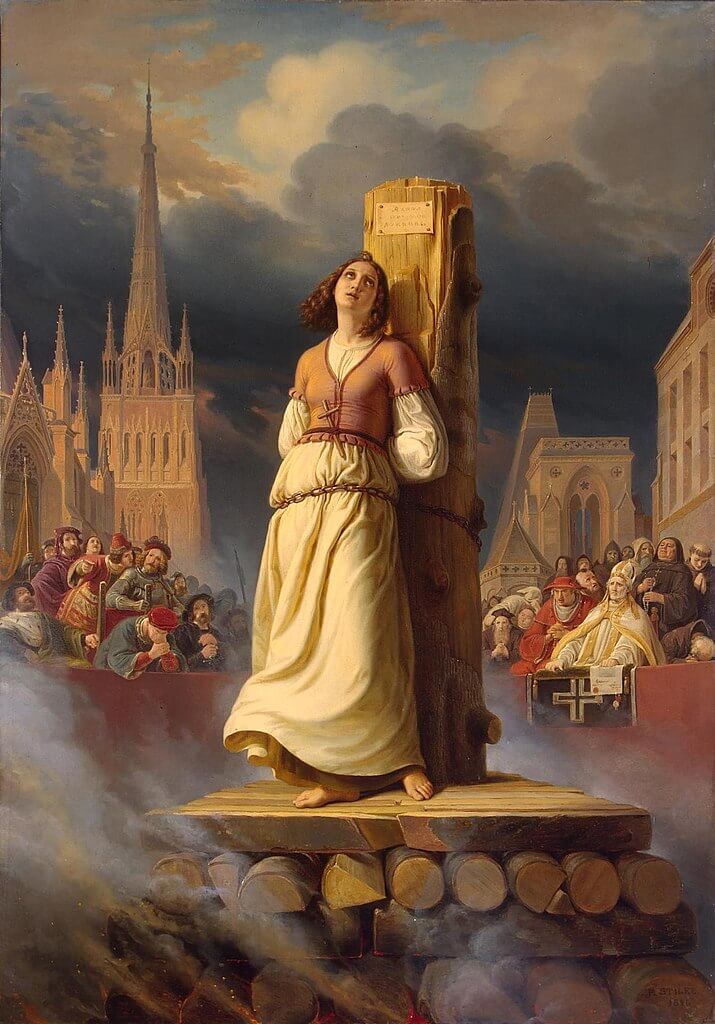
The ashes of her body were tossed into the river Seine.
A second Church trial twenty-five years later nullified the earlier verdict and found Joan innocent of all charges, paving the way for her veneration as a saint.
Long before Joan of Arc there had been heroes of patriotism…but in St. Joan patriotism reached its highest ideal and received its perfect consecration. It has been well said that with St. Joan patriotism itself was canonized by the Church.
Fr. Stephen J. Brown, S.J.
3 Signs of True Patriotism from the Example of Joan of Arc
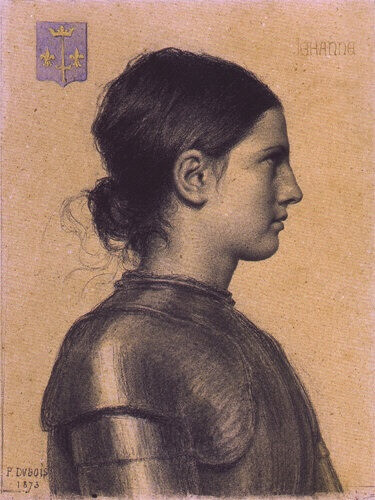
Let’s highlight important lessons from Joan’s life on the virtue of patriotism.
1. Patriotism is Not the Belief that One’s Nation is Superior to Others
Joan did not drive the English out of France because she believed that France was superior to England. Rather, she recognized that it was an injustice for England, a Christian nation, to make war on another Christian nation and attempt to rule it.
2. Patriotism Does Not Support the Evil Committed By One’s Country
The Church now recognizes that Joan was treated unjustly, and all parties were guilty of her wrongful public execution: the bishop who did not serve justice, the French who did not protect or save their heroine, and the English who looked for a way to kill her. Patriotism does not try to justify or overlook the evils committed by one’s country, but rather works to eliminate evils for the common good.
3. Patriotism Does Not Put Government Above God
Joan loved France and fought for her king and her country, but she did it first for the love of God as part of her duty to Him. Pope Leo XIII taught us that the Church lays a greater claim on our loyalty than the countries of our birth.
Putting Patriotism Into Practice…
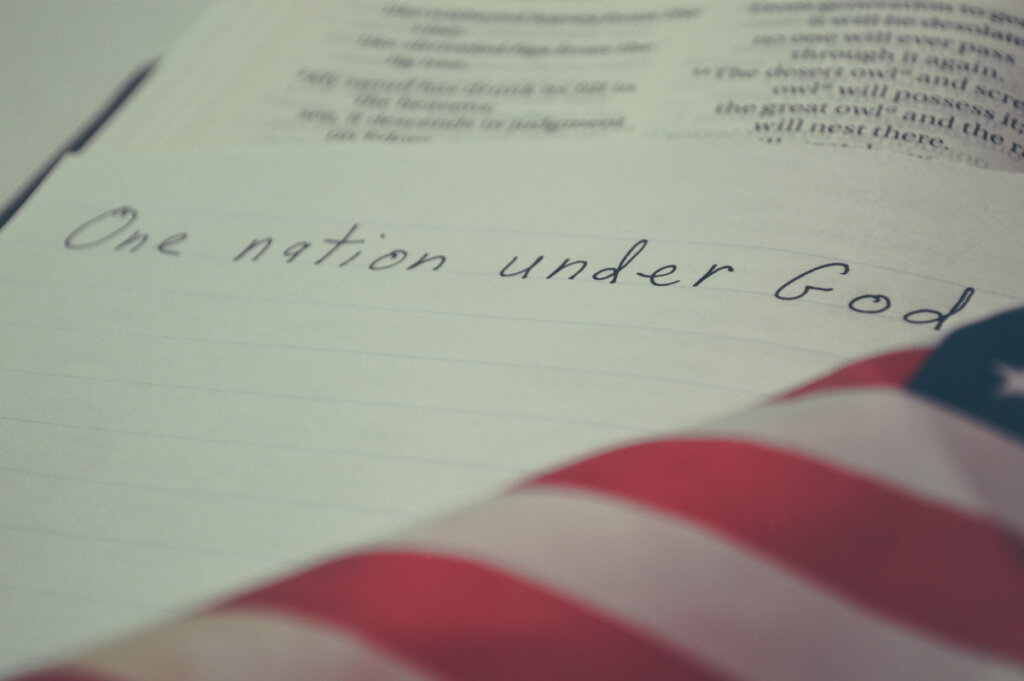
Serving in the military is a wonderful way to practice the virtue of patriotism. But there are also many other ways in which we can be patriotic no matter our physical condition or state in life.
The Venerable Fulton Sheen noted that our first duty of patriotism is to bring our Christian faith to the public square:
It is our solemn duty as Catholics to be conscious of our duty to America, and to preserve its freedom by preserving its faith in God.
Venerable Fulton Sheen
We can also support worthy politicians who aim to promote the common good, or become more involved with local legislative bodies such as city council or the school board. What will our nation be like if we do not have Christians serving in places of government and public service?
St. Paul admonishes us to pray for those in government authority (1 Tim. 2:1-3) so that we can live good and peaceable lives. As Catholics we can offer penances and sacrifices for the eternal salvation of our countrymen, for the safety of our active duty military, and for God to send us virtuous political leaders.
St. Joan of Arc, pray for us!
This is a free article from the fascinating series Heroic Virtue. To watch the video that accompanies this article, and to access the entire series, you can sign up here. Join thousands of others Catholics who have taken this digital journey!

